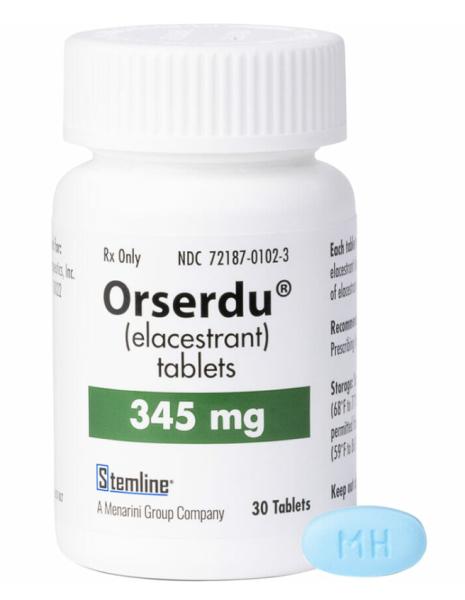Elacestrant Side Effects
Medically reviewed by Drugs.com. Last updated on Feb 18, 2025.
Applies to elacestrant: oral tablet.
Precautions
It is very important that your doctor check your progress at regular visits to make sure this medicine is working properly. Blood tests may be needed to check for unwanted effects.
It is unlikely that a postmenopausal woman may become pregnant. But, using this medicine while you are pregnant can harm your unborn baby. If you are a woman who can get pregnant, your doctor may do tests to make sure you are not pregnant before you start using this medicine. Use an effective form of birth control to keep from getting pregnant during treatment and for 1 week after your last dose. Male patients who have female partners should use effective birth control during treatment and for 1 week after the last dose. If you think you have become pregnant while using the medicine, tell your doctor right away.
This medicine may increase the level of cholesterol and fat in your blood. Talk to your doctor if you have concerns.
If you plan to have children, talk with your doctor before using this medicine. Some men and women using this medicine have become infertile (unable to have children).
Do not take other medicines unless they have been discussed with your doctor. This includes prescription or nonprescription (over-the-counter [OTC]) medicines and herbal or vitamin supplements.
Common side effects of elacestrant
Some side effects of elacestrant may occur that usually do not need medical attention. These side effects may go away during treatment as your body adjusts to the medicine. Also, your health care professional may be able to tell you about ways to prevent or reduce some of these side effects.
Check with your health care professional if any of the following side effects continue or are bothersome or if you have any questions about them:
More common side effects
- acid or sour stomach
- belching
- constipation
- decreased appetite
- diarrhea
- headache
- heartburn
- hot flush
- indigestion
- muscle or bone pain
- nausea
- stomach discomfort, upset, or pain
- unusual tiredness or weakness
- vomiting
Serious side effects of elacestrant
Along with its needed effects, elacestrant may cause some unwanted effects. Although not all of these side effects may occur, if they do occur they may need medical attention.
See also:
For healthcare professionals
Applies to elacestrant: oral tablet.
General adverse events
The most common adverse reactions (greater than 10%) included musculoskeletal pain, nausea, increased cholesterol, increased AST, increased triglycerides, fatigue, decreased hemoglobin, vomiting, increased ALT, decreased sodium, increased creatinine, decreased appetite, diarrhea, headache, constipation, abdominal pain, hot flush, and dyspepsia.[Ref]
Cardiovascular
- Very common (10% or more): Hot flush (11%)
- Uncommon (0.1% to 1%): Cardiac arrest, venous thromboembolism
Dermatologic
- Common (1% to 10%): Rash
Gastrointestinal
- Very common (10% or more): Nausea (35%), vomiting (19%), diarrhea (13%), constipation (12%), abdominal pain (11%), dyspepsia (10%)
- Uncommon (0.1% to 1%): Diverticulitis
- Frequency not reported: Stomatitis, gastroesophageal reflux disease
Gastrointestinal disorders were reported more frequently in patients 75 years or older.
Hematologic
- Very common (10% or more): Decreased hemoglobin (26%), anemia
- Common (1% to 10%): Decreased lymphocyte count
- Uncommon (0.1% to 1%): Acute hepatic failure
Hepatic
- Very common (10% or more): Increased AST (29%), increased ALT (17%)
Metabolic
- Very common (10% or more): Increased cholesterol (30%), increased triglycerides (27%), decreased sodium (16%), decreased appetite (15%), decreased calcium, decreased potassium, increased blood alkaline phosphatase
Musculoskeletal
- Very common (10% or more): Musculoskeletal pain (41%), arthralgia, back pain
- Frequency not reported: Bone pain, pain in extremity, musculoskeletal chest pain
Nervous system
- Very common (10% or more): Headache (12%)
- Common (1% to 10%): Syncope
- Frequency not reported: Dizziness
Other
- Very common (10% or more): Fatigue (26%)
- Common (1% to 10%): Asthenia
- Uncommon (0.1% to 1%): Septic shock, fatal adverse reaction (unknown cause)
Psychiatric
- Frequency not reported: Insomnia
Renal
- Very common (10% or more): Increased creatinine (16%)
- Common (1% to 10%): Urinary tract infection
Respiratory
References
1. (2023) "Product Information. Orserdu (elacestrant)." Stemline Therapeutics
2. (2024) "Product Information. Korserdu (elacestrant)." Menarini Stemline UK Ltd
More about elacestrant
- Check interactions
- Compare alternatives
- Dosage information
- During pregnancy
- Drug class: estrogen receptor antagonists
- En español
Patient resources
Other brands
Professional resources
Other brands
Related treatment guides
Further information
Elacestrant side effects can vary depending on the individual. Always consult your healthcare provider to ensure the information displayed on this page applies to your personal circumstances.
Note: Medication side effects may be underreported. If you are experiencing side effects that are not listed, submit a report to the FDA by following this guide.

